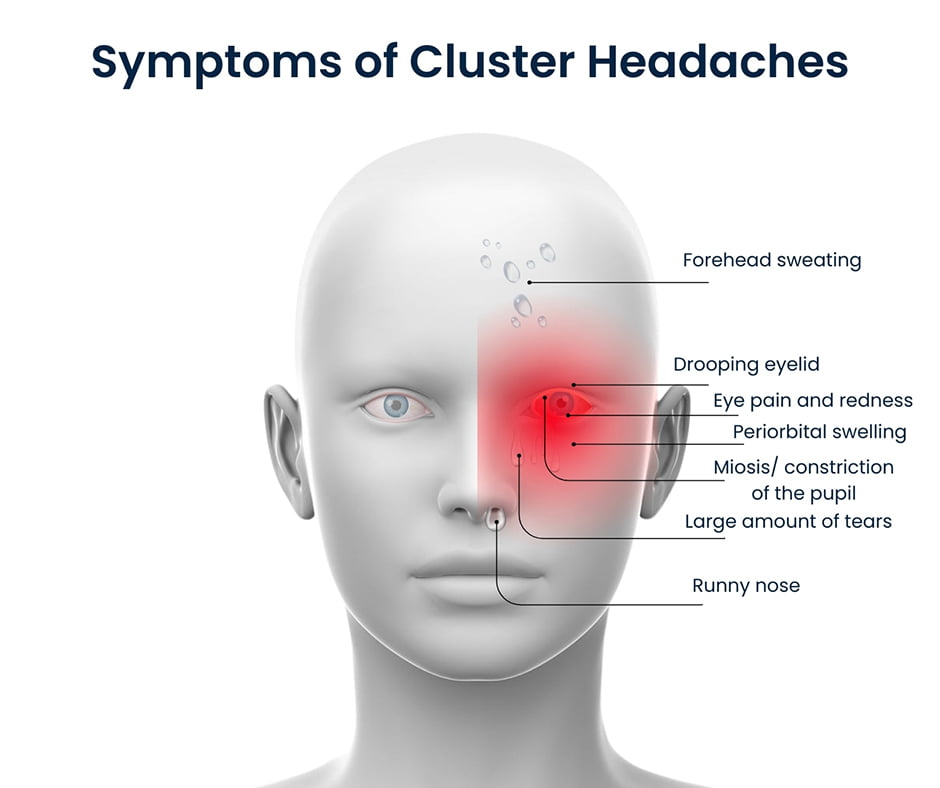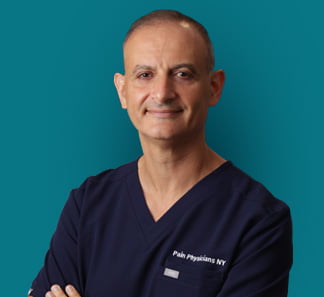Cluster headaches are strong, often debilitating headaches that can put you out of commission for months on end. To ensure you don’t fall victim to a constant barrage of cluster headaches with no recourse, call the cluster headache specialist at Pain Management NYC. Get the most accurate diagnosis of your headache pain, as well as the most effective treatment for cluster headaches at this New York City clinic offering a full range of diagnostic and treatment tools. Don’t put this call off; it could be lifesaving.
What Are Cluster Headaches?
Cluster headaches are an uncommon type of headache that can be easily confused with other sorts of headaches. What makes them unique is that cluster headaches are severe, one-sided headaches that usually occur one right after another, in groups. Often, they happen at the same time each day, and sometimes, they occur multiple times a day.
Get the most accurate diagnosis and effective cluster headaches treatments in New York City at Pain Management NYC. The best cluster headache specialist provides you with a personalized plan of care and follow-up services to ensure you remain as pain-free as possible.
What Are the Symptoms of Cluster Headaches?
The reason they’re called cluster headaches is that they usually happen within set periods of time in bunches or clusters. These headaches stop for periods of time too and you don’t always know when they’ll strike.
Cluster headache treatments typically are designed to reduce the frequency and duration of the clusters. Cluster headaches are rare, but when they hit, usually with no warning, they’re devastating.
The most common symptoms often mimic other types of headaches, bringing stabbing and shooting pain and also usually include:
- Eye pain and redness on the side of the head where it hurts
- Sweating
- Drooping eyelid
- Large amount of tears
- Anxiety and restlessness

What Causes Cluster Headaches?
At this point, experts are at a loss as to what causes these grueling headaches. They believe it has something to do with histamine or serotonin release near a facial nerve called the trigeminal nerve that’s associated with facial pain and a condition called trigeminal neuralgia. Others suppose it may involve the hippocampus of the brain.
A few more unusual attributes of cluster headaches include the facts that:
- They appear more often in men than women.
- Most patients are in their 20s to middle age, although they can occur at any age.
- They appear to be genetic.
These fierce headaches can be debilitating. They typically happen two or three hours after you fall asleep, but you can get them at any time of day. They can last for a week or for months at a time, at which time they become chronic.
How Are Cluster Headaches Diagnosed?
Cluster headaches can be mistaken for other types of headaches or easily misdiagnosed, which is why you must see a cluster headache specialist. A specialist ensures an accurate diagnosis. Some triggers of cluster headaches are identical to migraines.
There aren’t any definitive tests for diagnosing cluster headaches, so your doctor asks you many questions about your family history and about the symptoms you experience.
These exhausting cluster headaches fall into two categories that then become part of your diagnosis:
- Episodic. These headaches occur in clusters, lasting from one week to one year if not treated. They remain in remission when you’re pain free, meaning you’ve had no headaches for more than three months.
- Chronic. These headaches have a remission period of less than three months. During this time, the headache is nearly nonstop and can last as long as a year with no breaks. They usually happen at night and each cluster episode lasts for an average of 45 minutes.
How Can I Prevent Headaches?
Cluster headaches often happen when you’re exposed to specific triggers, which you want to avoid. It can take time for your doctor to pinpoint what sets off your particular headaches. Sometimes, people have only one trigger, while others have many.
Some of the triggers reported with cluster headaches include:
- Alcohol
- Heat
- Bright lights
- Smoking
In addition, high nitrate foods — such as preserved meats like bacon — can also have triggering effects. Physical exertion and high altitudes may also impact you.
You can have triggers that aren’t listed, so your doctor may advise you to start a journal to track your headaches with information such as:
- Day and time headache started
- What you were doing when it began
- Anything you had to eat or drink
- How long the headache lasted
What’s the Best Treatment for Cluster Headaches?
Although these headaches are brutal, the good news is that there is an effective treatment for cluster headache pain. The best treatment is the one that works for you. Although no cure has been found yet, treatments are available.
Cluster headaches treatment is separated into three groups:
- Treatment at time of attack may include high flow oxygen therapy. Medications, such as Imitrex® to alleviate the pain. Sometimes steroids or other anti-inflammatories are ordered. It may take a few attempts to know what cluster headaches treatments work at relieving your pain.
- Preventative treatments rely on discovering what your particular triggers are. When you and your specialist at Pain Management NYC analyze the information you’ve collected, it could assist you on your road to recovery from these devastating attacks.
- Other non-invasive cluster headaches treatments may include seizure medications, nerve blocks or injections.
If you live or work in or near New York City, you’re in luck. Pain Management NYC is where you can find a solution to your headache heartaches. The physicians at Pain Management NYC assess your symptoms and find an answer that works for you.
And if it’s determined that you don’t require specific cluster headaches treatment, your pain management doctor specializes in diagnosing and alleviating many other sources of headache pain, such as:
- Chronic migraines
- Nerve pain
- Neuropathies
- Complex regional pain syndrome
- Upper back pain
- Sciatica
- Pinched nerves
- Neck pain
- Herniated disc in your neck
- Neck arthritis
Whatever type of headache pain you have, contact Pain Management NYC as soon as you can. Bad headache pain can be a sign of a serious underlying condition like a tumor or dissection, which is a tear in a blood vessel that’s been weakened for some reason. Your cluster headache specialist checks all the boxes to ensure you get the proper cluster headache treatments or other treatment as needed.

Boleslav Kosharskyy, MD, is a top-rated, best-in-class interventional pain management doctor. He is board-certified in Anesthesiology, Interventional Pain Medicine, and Palliative Care.
Dr. Kosharskyy is an Associate Professor of Anesthesiology and Rehabilitation Medicine at Albert Einstein Medical College. He’s also the Associate Medical Director of Pain Medicine and Director of Anesthesia for the Joint Replacement Center at Montefiore Medical Center and Albert Einstein Medical College.
He is an active member of the American Society of Anesthesiology (ASA), the American Society of Regional Anesthesia and Pain Medicine (ASRA), and the New York State Society of Anesthesiologists (NYSSA)
